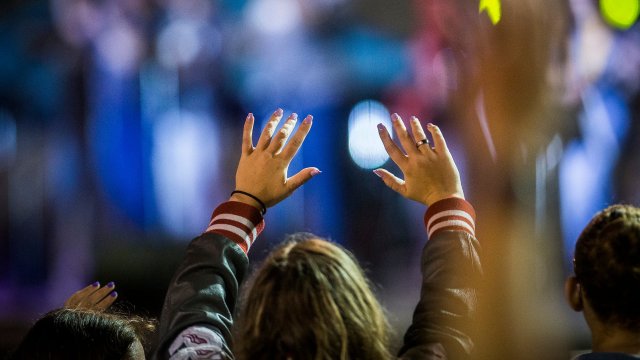Table of Contents
After FIRE’s intervention, Ohio city lifts ban on sale of ‘faith based items’ at Apple Butter Day festival

Barbarajo / Shutterstock.com
Tomorrow, the city of Groveport, Ohio, hosts its 50th annual Apple Butter Day festival. In previous years, Jake and Jan Seabaugh reserved booths at the festival to sell wood carvings and stained glass, including items with religious themes like crosses, doves, a Star of David, and carved signs with the words “Peace, Believe, Love.”
But this year, they declined to participate because the vendor application now bans the sale of “faith based items.” The application also prohibits the sale of items containing “socially offensive language.”
FIRE wrote the city on Wednesday, explaining these restrictions violate the First Amendment by targeting speech based on the viewpoint expressed.
To Groveport’s credit, the city’s law director called FIRE today and confirmed the city will allow the sale of faith-based items at tomorrow’s festival. The city also reached out to Jake Seabaugh, as well as a church and a religious organization that had previously reserved booths at Apple Butter Day, to notify them of the policy change. Although the application deadline has passed, the city will allow these groups to vend at the festival tomorrow if they so choose. The law director also confirmed the city will initiate a formal review of the vendor policy, including the other unconstitutional restriction on “socially offensive language.”
As FIRE’s letter explained, the First Amendment protects the expression of religious and nonreligious views alike. The Supreme Court has addressed this sort of scenario more than once. In Rosenberger v. Rector & Visitors of the University of Virginia, the Court held that a public university violated the First Amendment’s guarantee of free speech by denying a religious student magazine access to the same funding resources made available to secular student-run publications. As the Court stated, the “government must abstain from regulating speech when the specific motivating ideology or the opinion or perspective of the speaker is the rationale for the restriction.”
FIRE applauds the city of Groveport for promptly taking corrective action in response to our letter, ensuring vendors can exercise their First Amendment right to sell religious items at Apple Butter Day.
Groveport officials initially justified the restriction on “faith based items” by claiming it was necessary to avoid violating a different part of the First Amendment — that is, the part that bars the government from endorsing religion. But we need only return to Rosenberger to see why that’s incorrect, as the University of Virginia unsuccessfully made that same argument.
The Rosenberger Court cited a long line of precedent rejecting the “position that the Establishment Clause even justifies, much less requires, a refusal to extend free speech rights to religious speakers who participate in broad-reaching government programs neutral in design.” The university misunderstood the “critical difference between government speech endorsing religion, which the Establishment Clause forbids, and private speech endorsing religion, which the Free Speech and Free Exercise Clauses protect.”
Similarly, in Widmar v. Vincent, the Court held that the University of Missouri-Kansas City, having made its facilities generally available for activities of registered student groups, violated the First Amendment when it denied that benefit to a student group simply because it sought to use the facilities for religious worship and discussion. In rejecting university’s Establishment Clause argument, the Court noted that opening a forum “does not confer any imprimatur of state approval on religious sects or practices” and emphasized that the forum was “available to a broad class of nonreligious as well as religious speakers.”
The Supreme Court most recently reaffirmed this principle in Shurtleff v. City of Boston. There, the Court held that Boston violated the First Amendment when it denied the plaintiff permission to fly the Christian flag on a city plaza, as the city regularly allowed other outside groups to hold ceremonies and events at the plaza where they could fly flags of their choosing on city flagpoles.
Like the student magazine in Rosenberger, the student group in Widmar, and the flag-flyer in Shurtleff, Apple Butter Day vendors speak for themselves, not the government. The city simply allows them to reserve space at the festival. That entails even less government involvement than the university program in Rosenberger, which provided funds to private speakers.

Fellowship of Christian Athletes scores big Ninth Circuit win for religious liberty and freedom of association
News
Belief-based student groups won an important victory last week in a federal appeals court, which restored the ability of many such groups to meet on public campuses and in public schools in the many western states.
The ban on “socially offensive language” fares no better under the First Amendment. It, too, discriminates against speakers based on viewpoint.
Just like the restriction on “immoral or scandalous” speech that the Supreme Court struck down in Iancu v. Brunetti, a prohibition on “socially offensive language” is viewpoint-based because it “distinguishes between two opposed sets of ideas: those aligned with conventional moral standards and those hostile to them; those inducing societal nods of approval and those provoking offense and condemnation.”
The criterion “socially offensive” is also unconstitutionally vague. Laws and regulations restricting speech must give ordinary people fair notice of what is prohibited and must not give government officials excessive discretion to decide what may be said. Yet, the undefined term “socially offensive” means different things to different people; its enforcement will inevitably depend on the subjective, unpredictable judgment and biases of city officials.
FIRE applauds the city of Groveport for promptly taking corrective action in response to our letter, ensuring vendors can exercise their First Amendment right to sell religious items at Apple Butter Day. We look forward to seeing the city’s revised policy for future festivals, which should also eliminate the ban on “socially offensive language.”
Recent Articles
FIRE’s award-winning Newsdesk covers the free speech news you need to stay informed.

Texas tramples First Amendment rights with police crackdown of pro-Palestinian protests

Here’s what students need to know about protesting on campus right now

Kansas takes a stand for intellectual freedom


